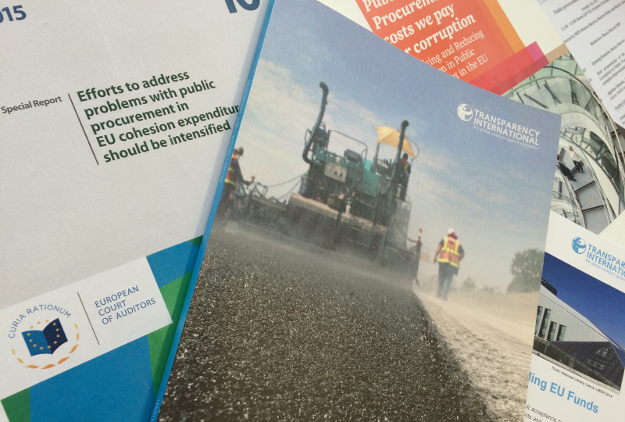Last month the European Court of Auditors published a special report called “Efforts to address problems with public procurement in EU cohesion expenditure should be intensified”. What that translates to in non-Brussels speak is how EU funds are being lost through errors or misreporting and what needs to be done.
The report highlights that at the beginning of 2015 twelve EU countries had not fulfilled public procurement conditions demanded by EU law. These are also the countries which tend to rank lowest in the EU on our annual Corruption Perceptions Index. In Bulgaria, Czech Republic, Greece, Croatia, Italy, Latvia, Hungary, Malta, Poland, Romania, Slovenia and Slovakia 41% of EU funded contracts were found to have errors.
Of those errors, 131 were deemed “minor”, such as the late publication of awarded contracts or audits. Some 288 were considered “significant”, such as where a tender could have received limited bids because it was rushed. “Serious” failings, such as a direct award granted without a public tender or the unlawful selection of a company, totalled 168. All of these errors were considered “red flags” in a 2013 PricewaterhouseCoopers (PwC) report which looked at corruption in public procurement in economic areas where Structural & Investment Funds have been used. The Court of Auditors found only 2% of cases were a result of fraud. But is this really the situation?
Clearly not. The PwC report, which was commissioned by the EU’s anti-fraud agency OLAF, found that overall bid rigging had occurred in almost half (48%) of the cases studied. PwC also found that in about 1 in 3 cases they looked at kickbacks had occurred, particularly in Spain and Romania.
More recently we have seen that some of these errors in contracts are not just a case of ticking the wrong box or sending-off the wrong form. Over the summer we reported on money meant for hospitals in Czech Republic ending up stuffed into wine boxes and ancient castles in Romania being ruined through corruption.
Perhaps these cases are just the tip of the iceberg, but without a proper analysis around errors in public contracts we simply don’t know. The Court of Auditors recognises this problem. Their report chastises both the Commission and member states for conducting a limited analysis of contracts and the errors made.
What is clear is that scrutiny is lacking and yet it is essential in determining where money goes. But it’s only half the battle. Prevention is also a necessity in ensuring money isn’t lost to corruption, fraud or mismanagement in the first place.
We have a tool that can do both. Transparency International and the European Commission are working together to roll out Integrity Pacts for structural and cohesion funded projects in several EU member states.
Integrity Pacts are essentially an agreement between the government offering a procurement contract and the companies bidding for it. The pact states that the companies will abstain from bribery, collusion and other corrupt practices during the execution of a contract. A third party, usually from civil society, then monitors the entire project process, to ensure that the process is transparent, clean and fair.
At each stage of the tendering process there are risks of irregularities. Things can go wrong from the very beginning. The Court found that the 82% of errors that occurred in the pre-tendering phase were serious. Integrity Pacts are designed to be in place from the very start, including the project planning and pre-tendering phase, to the final accounting and audit. That way external monitoring and a transparent tendering process can reduce irregularities.
Integrity pacts have been applied in more than 15 countries, in over 300 contracts across different sectors, including large scale public works projects, such as international airports and dam constructions.
Integrity Pacts can help safeguard EU funds, ensure that infrastructure projects and other public works are delivered efficiently, and stave off avenues for illicit gain. They can help promote cost efficiency and good governance, and can also encourage institutional changes, such as the increased use of e-procurement systems (just as the Court of Auditors recommends), simplified administrative procedures, improvements of regulatory environments and the promotion of good governance.
Transparency is needed in all steps in the procurement cycle, from the earliest decisions on needs assessments, developing a procurement plan and budget allocation, to bid evaluation, implementing the contracts and auditing performance. Integrity Pacts can provide this much needed transparency and stop public money going to waste. Hopefully, we will start to see less “errors” in the use of EU funds as we roll out Integrity Pacts across Europe.






